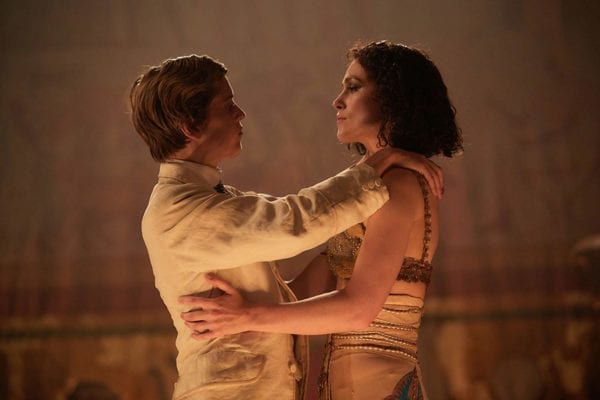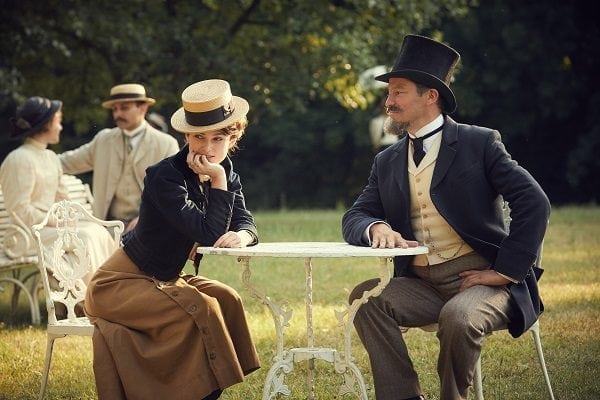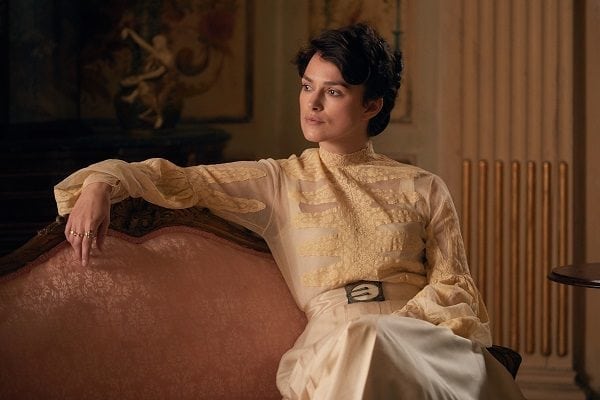Colette, 2018.
Directed by Wash Westmoreland.
Starring Keira Knightley, Dominic West, Fiona Shaw, Denise Gough, Ray Panthaki, Al Weaver and Dickie Beau.
SYNOPSIS:
Colette is pushed by her husband to write novels under his name. Upon their success, she fights to make her talents known, challenging gender norms.
Colette feels like a timely film in the wake of the #MeToo movement and with the continued battle for gender equality. A biography of Sidonie-Gabrielle Colette who wrote the Claudine novels under her husband’s name during the late 1890s/early 1900s she ultimately challenged him to have her name in print and to not have her achievements erased. Challenging gender stereotypes and cultural norms she’s a figure ripe for examination in the current climate.
The first thing that’s slightly unusual with Colette is the choice to have English actors, with English accents playing French people. It’s jarring at times to see Colette (Knightley) writing in French but then speaking with an English accent. It’s only distracting for a moment but it does beg the question of why this creative choice was made.
Whilst this is distracting, the film itself is fascinating and tells a story that I’m surprised isn’t more widely known. In the lead role as Colette is Keira Knightley who adds to her period piece repertoire. Her evolution from quiet country girl, to doting wife, frustrated woman and then challenger of gender norms and ultimately as a champion for individual identity is captivating. The way she holds herself evolves throughout and at no point do we feel that Colette is going to roll over and accept society for the way that it is. Those uncomfortable with strong women on screen may not enjoy Colette but there are lots of fist pumping moments throughout where she challenges the patriarchal system.
Alongside her is Dominic West as her husband Willy in a suitably pompous performance that manages to balance that fine line of being detestable but likeable. With a penchant for farting, sleeping around and locking Colette up in their house so that she writes whilst he gambles away their money, it’s a testament to West’s charisma that we can stand to watch Willy so much and enjoy it.
The intensity of Paris in the late 1800s is meticulously recreated and the costume design is exquisite. The recreation of “Claudine-mania” is fun to see and is depicted as a precursor to Beatlemania with everyone dressing as the character, cutting their hair and doing as much as they can to be the “real Claudine”. It’s fun and Colette manages to avoid the usual trappings of a period piece and instead explore more important issues around gender.
A lot of time is spent on Colette’s relationship with Missy (Gough) a noblewoman who was her significant partner for much of her life. Throughout the film Willy talks about her being unidentifiable and later Colette refers to her as him. Because of her noble stature she was able to wear suits and not be attacked for it which is an important point to note for the time. The exploration of gender in regards to Missy isn’t too in depth but it’s interesting that her and Colette’s relationship is depicted as the healthiest throughout the film.
Colette plays with lots of different ideas but is careful not to go too risqué and feels like a sanitised version of history at times. It will introduce many to a story they’re not familiar with and will show others how important the fight for gender equality is and how long it has been going for.
Flickering Myth Rating – Film: ★ ★ ★ ★ / Movie: ★ ★ ★ ★
Helen Murdoch














